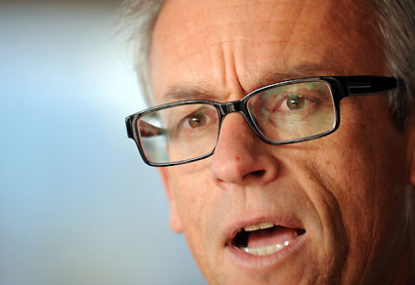Roar Guru

Bravo, John Grant. While I’ve never borne the seething contempt for David Gallop that others have carried around for 10 years, it has been clear to me for some time that the intended dynamism of the new commission was not reflected in its chief executive.
Chairman Grant called Gallop’s approach to the business of league “reactive”. An elegant euphemism and necessary considering a man had just been fired. As an independent observer, I would call Gallop pedestrian.
Yes, the game has grown strongly over the last decade but the roots had been laid down for its flowering a decade earlier, when the NSWRL cracked down on violence, introduced the 10-metre rule and sped up play-the-balls. The result was a flood of brilliant, younger players into the elite level of the sport. Only the Super League war halted the game’s advances.
David Gallop’s greatest achievement was getting out of the way, especially with regard to the creation of the independent commission. Ultimately, he allowed circumstances to eventuate that guaranteed his demise.
The eight-person body now running the game has no time for equivocation. They want someone who will attack the game’s problems, not provide hollow justifications for inaction.
Let us begin with the stadium policy in Sydney. This is the biggest issue facing the game: how the new CEO responds to it will carry ramifications for all aspects of league’s future.
There are too many teams in Sydney. New fans are not attracted to the old, small suburban grounds, no matter how much resonance they have for the Sydney clubs’ most loyal supporters.
A two-stadium policy won’t be the answer. It’s hard enough to fill Leichhardt or Toyota Park- the chances of fans driving long distances to an ostensibly neutral venue are slim.
So the new boss will have to find the right mix of rationalisation, relocation, careful selection of the biggest derbies for the bigger grounds or, least attractive to most politicians and administrators, more funding for improvement at suburban stadia.
Connected to this issue is the question of expansion. The AFL is not trying to rule Sydney by creating the Greater Western Sydney franchise, it is simply attempting to gain a stronger foothold. League must take the same approach. Perth awaits, as does the south island of New Zealand and another Brisbane team.
The question is: how much is the new CEO prepared to spread the available talent? The old 20-team competition was a debacle. I believe 18 is too many.
How will he guarantee that the new teams in new frontiers will be at the very least relatively competitive?
Which circles us back around to the salary cap. Teams must get larger exemptions for players they develop into superstars. Champion teams need to stay together if they can afford it; the unintended yet positive result of this is that it forces those clubs’ talented younger players, unable to dislodge the elite performers above them, to find positions elsewhere.
Fans form stronger bonds with successful clubs whose players remain constant over the years. Other teams are forced to develop players who they can also then have some assurance of holding onto.
The new CEO will have to balance the need to equalise the talent level between teams with an acknowledgment that the current system forces players to move clubs, codes, countries.
These are just the starting point. But the game’s future has never been more promising. With a fearless, innovative CEO at the top, this next epoch in the game’s evolution should be rugby league’s best so far.